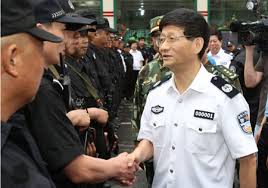The world watched over the past weeks how upcoming president
Xi Jinping and his premier
Li Keqiang took the stage, a smooth transition that was already set for more than five years. What was less predictable and shows some real changes is going on at the second and third level of China's party hierarchy. Especially the security forces have lost clout.
We plan a
China Weekly Hangout on what we can learn from those changes, and what reforms we can expect, if any. We planned the hangout for Thursday 29 November, but since developments are still coming in, we will delay that till December 6. (Not yet sure if there will a hangout on 29 November).
A whole slew of issues have indicated that important accounts have been settled among the leadership in Beijing.
Regarding the new financial masters,
Wei Gu reported that experienced bankers took over most jobs, people who are less likely to engage in any kind of experiments. Reform does not seem to be high on the finance agenda.
The disappearance the the Minister of Commerce
Chen Deming was a surprise for many. He did not make it into the Politburo, could therefore not be elevated into the standing committee of that Politburo as expected and now has to resign in March 2012. Has he been too tough during recent trade issues with foreign competitors? Or not too tough?
But then, to the surprise of many,
Liu Yunshan, for ten years the strongman in charge of media and censorship, made it into the Standing Committee, although he had enough chances to make himself unpopular in his previous post.
Personal changes in the
People's Liberation Army (PLA)
have started long before the autumn congress of the Communist party,
but are still going on. High-profile events, like the first landing on the aircraft carrier Liaoning, seem to put the military on a higher level than in the past.
 |
Meng Jianzhu, the new head of the Politics
and Law Commission |
But the real accounts are being settled within the Politics and Law Commission, the powerful organisation overseeing police, spies, judiciary and prosecutors, and commanding a budget of in total 111 billion US dollars. This powerful commission, considered to be a state-in-the-state, lost its representative in the Standing Committee, a severe degradation in China's hierarchy.
Wall Street Journal's Jeremy Page linked the loss of this position in the Standing Committee to the case of
Bo Xilai, the disposed party chief of Chongqing, waiting for his process.
Other media followed this lead. This Commission could have been the Trojan horse, threatening Xi Jinping's position from the inside, was the explanation for the Commission's downgrade.
After this downgrade, in the Commission's jurisdiction a few old issues popped up, showing the security forces are really taking beat after beat.
The illegal way of imprisoning people, the "reform through labor" system, should have ended decades ago according to according to almost everybody, apart from the police forces. But both domestic and international pressure against this police tool of illegal detention could not overcome police resistance.
The issue is now firmly back on the agenda.
Using the organs of executed prisoners for transplantation was such another issue, causing domestic and international embarrassment for China. Also here domestic and international uproar did not end this source of income for local police authorities.
This issue is also back on the agenda.
And while it seems rather unlikely China will be heading very fast in the direction of a more independent judiciary, judges might get more freedom to follow the law, and not the party, now the police forces are losing their powerful position in the party commissions.
Update: Tealeafnation brought on 28/11 an additional overview of the ongoing rumors on more drastic changes in China's admininistrative structures:
- The power of the National Development and Reform Commission, the State Council’s omnipotent arm that sets developmental agendas and coordinate economic activities, would face new limits. The commission, a living fossil of an organization from China’s planned economy days, would focus on planning and regulation at the macro level and relinquish its oversight over “micro-level” administrative matters such as adjusting prices of gasoline and, more importantly, its power to approve projects.
- The Ministry of Railways would become a division in the Ministry of Transportation. Also a legacy from the planned economy era, the Ministry of Railways has been increasingly criticized for its dual role as both a supervisor of China’s massive railway industry and a player in the railroad business. Many expect this rumored change to be the first step toward breaking the state’s monopoly on the railway industry.
- The National Population and Family Planning Commission would be merged with the Ministry of Health, becoming the Ministry of Population and Health. The waning of the Commission’s power possibly hints that the one-child policy could be loosened in response to the expected demographic crisis of China’s aging population and wider condemnation of the practices of forced abortion in certain parts of China.
- The rumored changes would also befall the media and financial sectors. The infamous State Administration of Radio, Film and Television (SARFT) and the General Administration of Press and Publication (GAPP), two major enactors of media censorship, would be merged into the Ministry of Culture. The Banking Regulatory Commission, the Securities Regulatory Commission and the Insurance Regulatory Commission would be combined into a new Regulatory Commission of Finance.
What will happen to nuclear power in China, now the NIMBY movement is gaining force? In the China Weekly Hangout of last week,
Richard Brubaker of CEIBS and Fons Tuinstra of the
China Speakers Bureau analyzed the possible effects of China's resumption of its ambitious nuclear program.
Other China Weekly Hangouts are here.